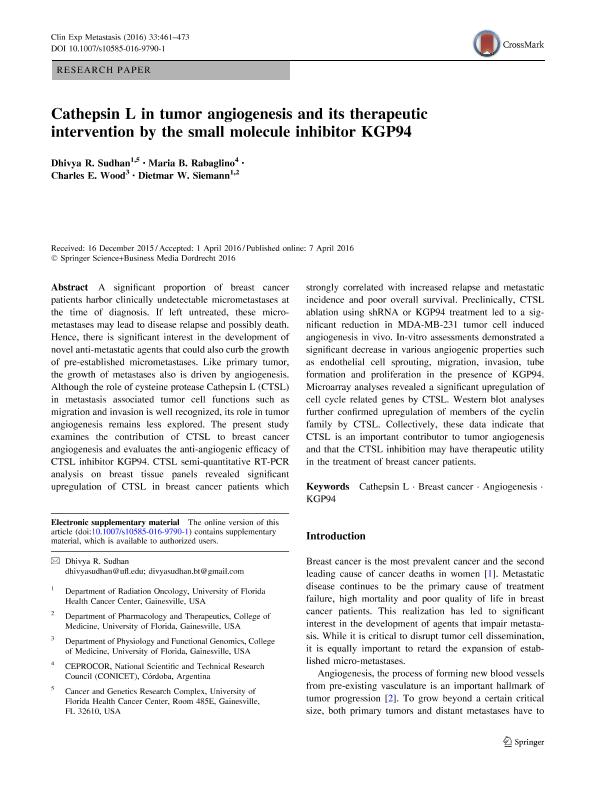Mostrar el registro sencillo del ítem
dc.contributor.author
Sudhan, Dhivya R.
dc.contributor.author
Rabaglino, Maria Belen

dc.contributor.author
Wood, Charles E.

dc.contributor.author
Siemann, Dietmar W.
dc.date.available
2022-12-02T11:11:50Z
dc.date.issued
2016-06
dc.identifier.citation
Sudhan, Dhivya R.; Rabaglino, Maria Belen; Wood, Charles E.; Siemann, Dietmar W.; Cathepsin L in tumor angiogenesis and its therapeutic intervention by the small molecule inhibitor KGP94; Springer; Clinical & Experimental Metastasis; 33; 5; 6-2016; 461-473
dc.identifier.issn
0262-0898
dc.identifier.uri
http://hdl.handle.net/11336/179936
dc.description.abstract
A significant proportion of breast cancer patients harbor clinically undetectable micrometastases at the time of diagnosis. If left untreated, these micro-metastases may lead to disease relapse and possibly death. Hence, there is significant interest in the development of novel anti-metastatic agents that could also curb the growth of pre-established micrometastases. Like primary tumor, the growth of metastases also is driven by angiogenesis. Although the role of cysteine protease Cathepsin L (CTSL) in metastasis associated tumor cell functions such as migration and invasion is well recognized, its role in tumor angiogenesis remains less explored. The present study examines the contribution of CTSL to breast cancer angiogenesis and evaluates the anti-angiogenic efficacy of CTSL inhibitor KGP94. CTSL semi-quantitative RT-PCR analysis on breast tissue panels revealed significant upregulation of CTSL in breast cancer patients which strongly correlated with increased relapse and metastatic incidence and poor overall survival. Preclinically, CTSL ablation using shRNA or KGP94 treatment led to a significant reduction in MDA-MB-231 tumor cell induced angiogenesis in vivo. In-vitro assessments demonstrated a significant decrease in various angiogenic properties such as endothelial cell sprouting, migration, invasion, tube formation and proliferation in the presence of KGP94. Microarray analyses revealed a significant upregulation of cell cycle related genes by CTSL. Western blot analyses further confirmed upregulation of members of the cyclin family by CTSL. Collectively, these data indicate that CTSL is an important contributor to tumor angiogenesis and that the CTSL inhibition may have therapeutic utility in the treatment of breast cancer patients.
dc.format
application/pdf
dc.language.iso
eng
dc.publisher
Springer

dc.rights
info:eu-repo/semantics/openAccess
dc.rights.uri
https://creativecommons.org/licenses/by-nc-sa/2.5/ar/
dc.subject
ANGIOGENESIS
dc.subject
BREAST CANCER
dc.subject
CATHEPSIN L
dc.subject
KGP94
dc.subject.classification
Otras Ciencias de la Salud

dc.subject.classification
Ciencias de la Salud

dc.subject.classification
CIENCIAS MÉDICAS Y DE LA SALUD

dc.title
Cathepsin L in tumor angiogenesis and its therapeutic intervention by the small molecule inhibitor KGP94
dc.type
info:eu-repo/semantics/article
dc.type
info:ar-repo/semantics/artículo
dc.type
info:eu-repo/semantics/publishedVersion
dc.date.updated
2022-11-30T22:37:19Z
dc.journal.volume
33
dc.journal.number
5
dc.journal.pagination
461-473
dc.journal.pais
Alemania

dc.journal.ciudad
Berlin
dc.description.fil
Fil: Sudhan, Dhivya R.. University of Florida; Estados Unidos
dc.description.fil
Fil: Rabaglino, Maria Belen. Consejo Nacional de Investigaciones Científicas y Técnicas. Centro Científico Tecnológico Conicet - Córdoba; Argentina
dc.description.fil
Fil: Wood, Charles E.. University of Florida; Estados Unidos
dc.description.fil
Fil: Siemann, Dietmar W.. University of Florida; Estados Unidos
dc.journal.title
Clinical & Experimental Metastasis

dc.relation.alternativeid
info:eu-repo/semantics/altIdentifier/url/https://link.springer.com/article/10.1007/s10585-016-9790-1
dc.relation.alternativeid
info:eu-repo/semantics/altIdentifier/doi/http://dx.doi.org/10.1007/s10585-016-9790-1
Archivos asociados
